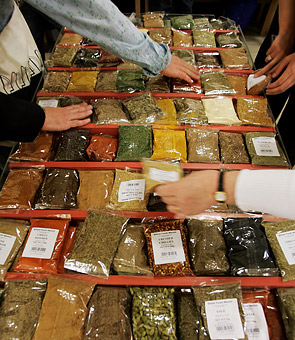
Every diet begins with good intentions. You swear to eat your veggies, lay off the chocolate cake and exercise every day. This works fine, at first. But then one day you stroll by a Cinnabon shop and are seduced by the sugary-sweet aroma. Or you're at a dinner party and can't say no to that heaping helping of lasagna. Soon, you're back at square one — and hating yourself.
Why do we all give in so easily to rich, heavily flavored foods? Here's an answer that won't exactly come as a bulletin: they taste good. The better things taste, the more we enjoy them. And the more we enjoy them, the more satisfied we feel. Hidden in that little equation is a trick that may help you lose weight. Your brain is hardwired to keep you eating as much as possible — an artifact of our wild origins when the risk of famine was always very real and we thus had to gorge ourselves whenever we could. Not only do we want to eat a lot of food, we specifically want to eat a lot of calories. A spoonful of peanut butter will keep you alive longer than a spoonful of Jell-O, after all, so best to develop a taste for such dense, heavy stuff. There are a lot of things that tip us off that a food is probably high in calories: creamy texture, complex flavors, heavy spices.
"Taste has always been the No. 1 factor when deciding what to eat," says Ruth Frechman, a registered dietitian and spokeswoman for the American Dietetic Association. But taste and feel can fool you. Yogurt is creamy, but that doesn't mean it's high in calories. Salsa is spicy, but it's low in fat and high in fiber. Your brain can't always sort out these differences, so why not spin that to your advantage?
When it's time for a diet, the first thing you want to do is hit the spice rack. "Food can be healthy and delicious," says Keri Gans, a registered dietitian in New York City. Plain chicken breasts and broccoli for dinner are boring; add a little teriyaki sauce to your greens, and rub some spices on the meat, and you've got a low-fat meal you can actually enjoy. For dessert? With summer berries at their peak, it's easier to skip the ice cream.
What's more, you can forget the no-snacking rule. Snacks can actually help stabilize your blood-sugar level, making it easier to curb your cravings come meal time. You don't have to limit yourself to baby carrots and celery sticks — at least not by themselves. Low-fat dips or gourmet mustards can make dietary virtuousness feel like indulgence. Sunflower seeds and almonds are, in fact, indulgences, but in moderation, they can be both satisfying and safe. A fruit smoothie whipped up in the blender is doubly smart: fruit is sweet — which the calorie-craving brain loves — and the air that gets stirred in during the mixing causes you to feel full faster and stay that way at least a little longer. As powerful an appetite tamer as flavor can be, it pays to be careful. In June, Dr. Alan Hirsch, a neurologist who runs the Smell & Taste Treatment and Research Foundation in Chicago, presented a paper at the Endocrine Society's annual meeting in San Francisco that described how particular sweet and salty smells helped obese subjects lose 30 lb. in six months. Hirsch believes he has pinpointed some of those scents and has incorporated them into a line of artificially flavored crystals called Sensa, which come in 12 sweet and salty varieties that can be sprinkled on foods.
Hirsch may well be on to something. His work focuses on the hypothalamus, a region of the brain known to be associated with satiety, and if Sensa can indeed hit that neural bull's-eye, it could be powerful stuff — and will probably give rise to a lot of similar products. But there's reason to be skeptical. For starters, Hirsch's paper has not yet been peer-reviewed or published. What's more, he admits that he has not followed up with his subjects in the three years since he completed the trial to find out if they have kept the weight off. As anyone who has ever dieted knows, it's not losing the pounds that's hard — it's keeping them lost. Finally, Sensa costs $59 for a one-month supply.
It's possible there's a future for such hypothalamic preparations, and further research on Sensa will help answer that question. But in the meantime, here's my calculation. Instead of sprinkling your potatoes with some artificial this or that, talk to a nutritionist who can help you devise an eating plan that works for you. Or look online for healthier ways to prepare your favorite foods. (Try the Mayo Clinic's Food & Nutrition Center.) You don't have to be a food fanatic to eat right. And oh, yes, snacking is encouraged.
— With reporting by Anita Hamilton
Sanjay Gupta's Fit Nation series airs on House Call on CNN, Saturdays and Sundays, at 8:30 a.m. E.T.